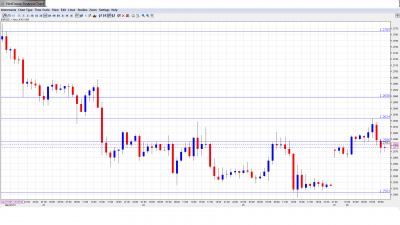Euro USD is showing some volatility as we begin a new trading week. The pair showed some upward movement on the weekend following a poll in Greece that the main pro-bailout party may be able to form a coalition after the June 17 elections. However, the euro gave up most of these gains early on Monday, after Spain announced Sunday that it intends to recapitalize Bankia, the country’s fourth largest lender. There are no Euro-zone or US releases today, as the markets are closed today for holidays.
Here’s an update on technicals, fundamentals and what’s going on in the markets.
EUR/USD Technicals
- Asian session: The pair moved upwards, reaching a high of 1.2612, and consolidated just above the 1.26 line, at 1.2605. The pair has weakened slightly in the European session, trading at 1.2575.
- Current range: 1.25 to 1.2587.
- Further levels in both directions: Below: 1.25, 1.24 and 1.2320.
- Above: 1.2587, 1.2623, 1.2660, 1.2760, 1.2814, 1.2873, 1.29, 1.2960, 1.30, 1.3050, 1.3110 and 1.3180.
- 1.2587 is fluid, and is currently providing weak resistance to the pair.
- 1.25 is the next support level.
Euro/Dollar down over concerns about Spanish banking sector- click on the graph to enlarge.
EUR/USD Fundamentals
No economic releases are scheduled today.
For more events and lines, see the Euro to dollar forecast
EUR/USD Sentiment
- Poll in Greece supports bailout: A weekend poll in Greece indicated that the conservative New Democracy party may be able to form a government following the June 17 elections. The party favors accepting the bailout package and keeping Greece in the euro-zone. Over the weekend, the euro moved upwards on the news. Traders must be asking themselves what happens if there is a poll showing the anti-bailout forces doing well? Will the euro bounce up and down for the next three weeks based on every election poll coming out of Greece? One thing is clear – the markets will need to brace themselves for a lot of uncertainty until the Greek elections are over. See how to trade the Grexit with EUR/USD.
- Contingency plans for Grexit gain momentum: At the recent EU Summit, EU leaders declared their support for Greece to remain in the Euro-zone. Behind the scenes, however, there are contingency plans for a Greek exit from the zone. The Eurogroup Working Group, comprised of experts who report to the EU finance ministers, has apparently instructed member states to begin making contingency plans for a Greece exit. French banks are among the most exposed to Greek debt, and several of them, including Credit Agricole, BNP Paribas and Societe Generale, have drawn up plans for a worst-case scenario. Talk of a Greek exit, which were taboo until recently, is now being discussed openly.
- Italy supports Eurobond concept: Italian Prime Minister Mario Monti surprised the markets with his endorsement of joint eurobonds to help resolve the financial crisis. The idea of eurobonds has been floating for a long time, and Germany rejected it time after time, including in the latest EU Summit, when the new French president suggested it. Other members, such as Ireland, support considering the idea, but the the Italian endorsement carries a lot of of weight in EU policymaking circles. Perhaps Monti is busy keeping Italian troubles out of the limelight: the Italian economy shrank at an alarming rate of 0.8% in Q1, and the the slump continues, according to PMIs.
- Germany releases weak data: As if the Euro-zone didn’t have enough problems, Germany, the locomotive of the Euro-zone, produced weak data in several fields. The German Business Climate and Manufacturing PMI indicators were both below market forecast, and concerns are mounting that the reliable German economy may be sputtering. Strong German growth saved the euro-area from an official recession in Q1, but now Germany is drawn downwards rather than pulling everybody else out of trouble. Further weak releases out of Germany could spell more trouble for the fragile euro.
- Spain injects funds into banks: Concerns about the health of Spain’s banking sector are increasing following the government’s announcement Sunday that it will recapitalize Bankia, the fourth largest lender in the country. There are fears that the high cost of bank rescues will force Spain to seek an international bailout. A bailout for the country would have serious implications not just for Spain, but for the entire Euro-zone as well.
- US data points to slow growth: Jobless claims have stabilized at around 370K and home sales were above market forecast. Nevertheless, the weakness in durable goods orders and other signs draw a mixed picture. Markit’s new Flash Manufacturing PMI for the US shows that manufacturing is growing, but slower, with a drip from April to May.

